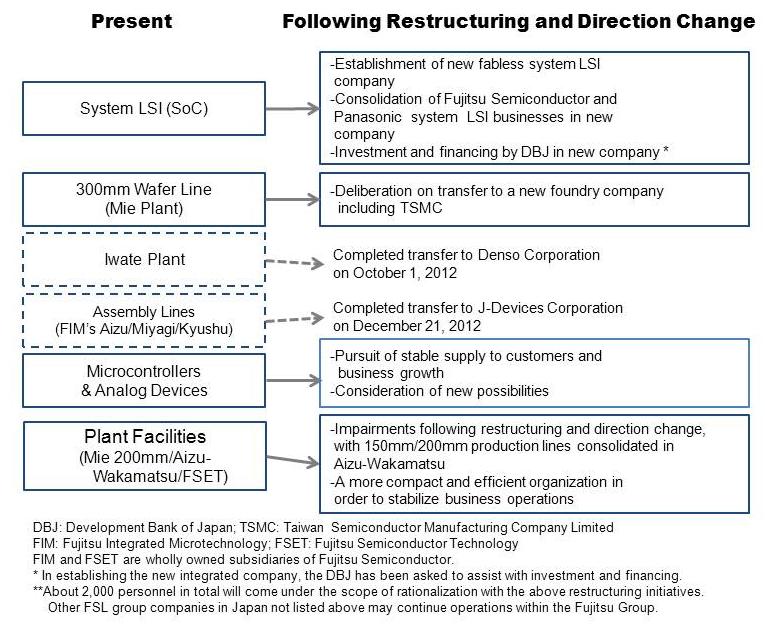Tokyo and Yokohama, February 07, 2013
Fujitsu Limited and Fujitsu Semiconductor Limited today announced the restructuring and new direction of their semiconductor business.
Restructuring and New Direction of Semiconductor Business
Since fiscal 2009, Fujitsu and Fujitsu Semiconductor have advanced their semiconductor business in accordance with a proprietary "fab-lite" business model. Since fiscal 2011, however, this business has been confronted with an extraordinarily difficult operating environment as sales declined due to fast-deteriorating market conditions and an increasingly severe competitive climate. In response, the companies accelerated the fab-lite strategy, starting with the transfer of ownership of Fujitsu Semiconductor's Iwate Plant and LSI assembly and test facilities. Seeking to further develop their semiconductor business, and to build a more robust foundation for business based on their portfolio of technologies, Fujitsu and Fujitsu Semiconductor have considered a variety of options, including talks with outside companies.
Today, Fujitsu and Fujitsu Semiconductor have decided to establish a new fabless company with the integration of Fujitsu Semiconductor's system LSI business with that of Panasonic Corporation. Another initiative is the deliberation on the transfer of the Mie Plant to a new foundry company, including Taiwan Semiconductor Manufacturing Company Limited (TSMC). The decision has been made to move forward on planning to establish a new foundry company, to which Fujitsu Semiconductor's Mie Plant is to be transferred.
As a result of these decisions, the scale of Fujitsu's system LSI business will expand and be operated as an independent company. Fujitsu is considering numerous options with the aim of offering a stable supply of products to customers through its microcontroller and analog device businesses. After taking into account impairment on fixed assets due to further restructuring, Fujitsu Semiconductor's 150mm/200mm wafer lines, where improvements to capacity utilization rates are vital, will be consolidated in Japan's Aizu-Wakamatsu region. In so doing, Fujitsu aims to streamline production capabilities and rationalize personnel resources to achieve a more compact organization with stable business operations.
 Restructuring and New Direction of Fujitsu's Semiconductor Business
Restructuring and New Direction of Fujitsu's Semiconductor Business
Restructuring and New Direction of Fujitsu's Semiconductor Business
(1) Integration with Panasonic's System LSI Business
Fujitsu and Panasonic have come to a basic agreement to establish a new fabless company, in which capital participation from outside investors will be accepted. The new company will consolidate design and development of system LSI through the transfer of design and development capabilities of each of Fujitsu Semiconductor's and Panasonic's system LSI businesses. In establishing the new integrated company, Development Bank of Japan Inc. (DBJ) has been asked to assist with investment and financing.
The new company aims to be a world class system LSI leader, conducting independent business operations to provide solutions in high performance, imaging and wireless fields.
For further details, see "Fujitsu and Panasonic to Consolidate System LSI Businesses in New Company."
(2) Transferring the 300mm Line of the Mie Plant
Traditionally, LSI makers have moved forward on the design and development of circuitry through specialized fabless plants and have promoted specialization of foundry companies to which manufacturing has been outsourced. Since 2009, when Fujitsu Semiconductor switched to a proprietary fab-lite business model, it established a strong business relationship with Taiwan Semiconductor Manufacturing Company, Ltd. (TSMC) in system LSI devices using leading-edge 40-nanometer (nm) and beyond process technology. Now, in line with the fabless operations in the system LSI business stated above, consideration has also been given to the transfer of 300mm line to a new foundry company including TSMC. The goal is to develop a business model that together with offering customers both in and outside of Japan, high quality, advanced semiconductors, will also work to develop exceptional competitiveness and sustainable growth in global semiconductor markets.
(3) Microcontroller and Analog Device Business
Fujitsu Semiconductor has traditionally concentrated its efforts into supplying general-purpose MCUs for automobiles, industry, and consumer electronic areas in the microcontroller and analog device business, all while working to launch new products and expand sales channels. Fujitsu Semiconductor aims to offer a stable supply to its customers and develop its business, and is taking a close look at an entire range of possibilities.
(4) Fujitsu Semiconductor's New Direction after Restructuring
After integration of the system LSI business to establish a new company as well as the transfer of the 300mm line of the Mie Plant, which are initiatives now under consideration, Fujitsu Semiconductor's manufacturing facilities will consist primarily of the 200mm line in Mie, the 150mm line in Aizu-Wakamatsu and the 200mm line of Fujitsu Semiconductor Technology (FSET). The decision on the policy to implement this restructuring will be the basis for impairment on fixed assets. In so doing, production and human resources can be rationalized to improve capacity utilization and lead to stable management.
In line with the decision to restructure these operations, approximately 2,000 people throughout the Fujitsu Semiconductor group will come under the scope of rationalization. Fujitsu Semiconductor will move forward with the aim of building a compact and streamlined management structure, together with continuing to provide to customers the same products and services.
2. Impact on Financial Results (Consolidated and Unconsolidated)
As a result of the restructuring and switch to a new direction in its semiconductor business, Fujitsu factored in an extraordinary loss of 57.0 billion yen in its fiscal 2012 third quarter. In the fourth quarter as well, to continue structural reforms of the semiconductor business, Fujitsu Semiconductor may undergo additional impairments.
In addition, for the impact on its unconsolidated financial projections, Fujitsu factored in an affiliated company valuation loss of 165.4 billion yen.
These materials may contain forward-looking statements that are based on management's current information, views and assumptions and involve known and unknown risks and uncertainties that could cause actual results, performance or events to differ materially from those expressed or implied in such statements. Actual results may differ materially from those projected or implied in the forward-looking statements.
